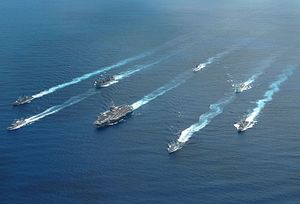How should the United States manage its partnerships with global navies? What do these partnerships offer the United States? These questions have animated discussions of maritime strategy over the last decade, with strong partisans landing on different sides of each question. The latest blows follow Admiral James Foggo’s article in Proceedings: “Forging a Global Network of Navies”.
Foggo argues that the United States Navy needs to continue to focus on building partnerships with foreign navies, in order to accomplish ends that multiple maritime nations share. Foggo cites a series of multilateral successes, including humanitarian relief operations and anti-piracy efforts.
Foggo’s case builds upon a set of similar arguments that the Navy has made since the early part of last decade. Initially termed the 1,000 Ship Navy, these proposals have concentrated on leveraging partnerships in order to accomplish maritime ends. These arguments culminated in the Cooperative Strategy for 21st Century Seapower.
Claude Berube and CDR Salamander push back against Foggo, invoking many of the traditional concerns about cooperative strategies. In brief, the development of relationships does not necessarily create political commitment on the part of governments, partner capabilities can rarely match the capacity of the USN, partners tend to lack political will on the issues most important to the United States, and partnerships create unexpected friction that undermines efficiency.
These concerns are misplaced.
The “global network of navies” isn’t about replicating the capabilities of U.S. forces in every navy across the world. Any understanding of cooperation that fails to appreciate this aspect will see cooperative action as inherently flawed. At the same time, failing to understand the promise of cooperation is inherently self-limiting with respect to maritime governance.
Instead, cooperative naval action means:
a) Recognizing that the accomplishment of many maritime tasks does not require the best that the U.S, has to offer
b) Harnessing regional expertise, local political relationships, and local political will
The appropriate ambitions are “What can be done with the vast material available to us through cooperative channels,” followed closely by “How can we enhance specific partner capabilities?” and “How can we increase general awareness of the rules of the road?”
None of this happens without cooperative effort, and in particular none of this happens without a theoretical framework for understanding the contributions that navies can make to one another. This is what the cooperative approach, in its various iterations, has always promoted. Human-to-human interaction, facilitated by a broader strategic approach, provides the foundations for integration.
There are limits. Any approach that envisions cooperative naval efforts as inducing systematic change in the political preferences of partner states will necessarily fail. The Cooperative Strategy isn’t going to transform China from a revisionist to a status quo power. We can also grant that coalition warfare sucks. No one likes to depend on others, especially when those others have varying levels of commitment and expertise. The experience in Afghanistan has demonstrated many of the shortcomings of coalition warfare, even in context of a much tighter coalition (NATO) than we can expect from a cooperative maritime strategy.
But if official statements from policymakers overstate the potential gains from cooperation and understate the difficulties, it will surely won’t be the first time such a thing has happened in military history.
What I find most remarkable is the belief that eschewing the difficult work of establishing cooperative relationship will somehow give the USN the ability to conjure new cruisers and destroyers out of Congress. The notion that if only the Navy really tries to make a case for itself, it can create sufficient “national will” by mobilizing public opinion in favor of a vast expansion in shipbuilding is, in the end, far more fanciful than the idea that devoting attention to partnership building will pay off in the future.

































